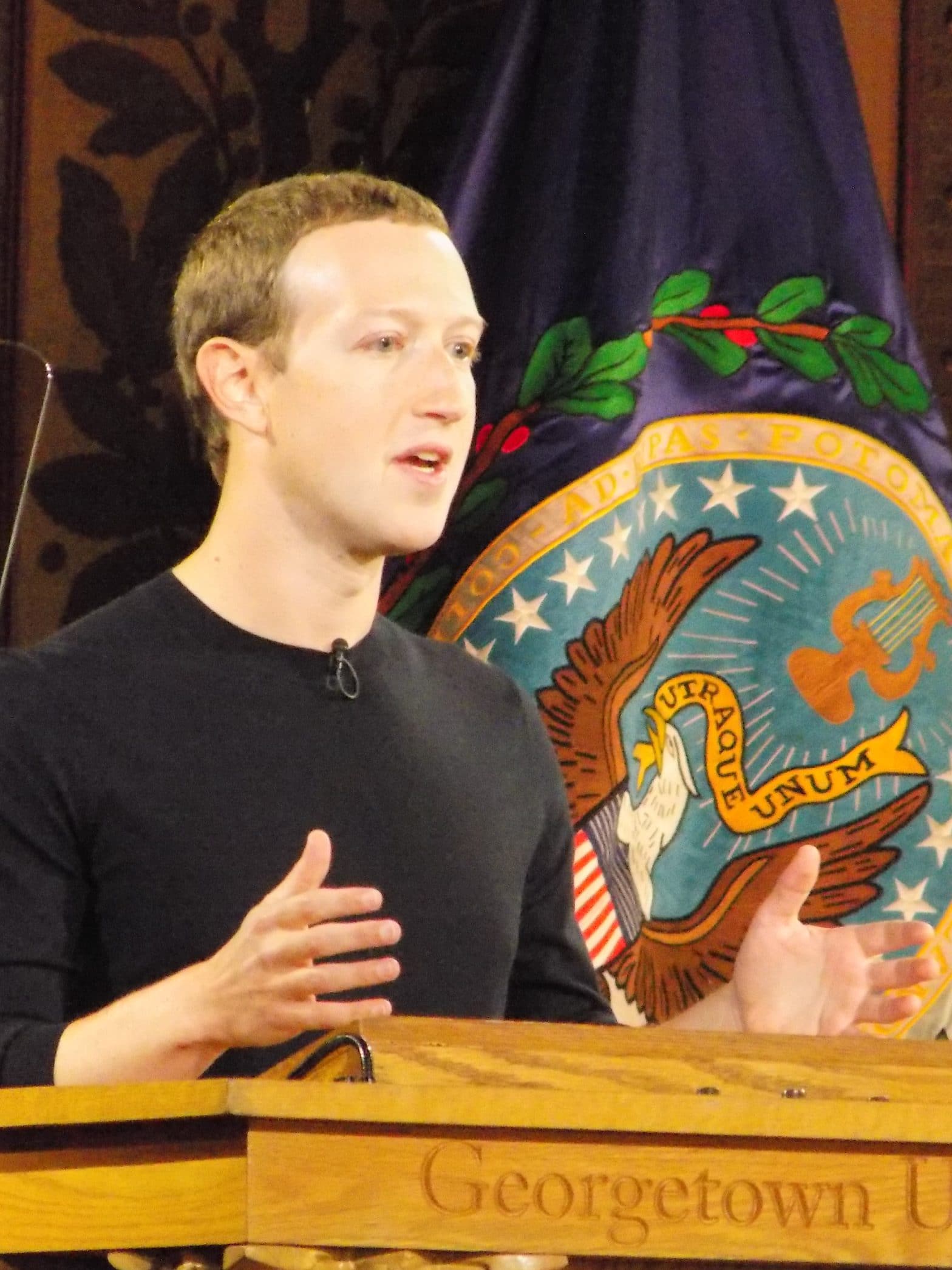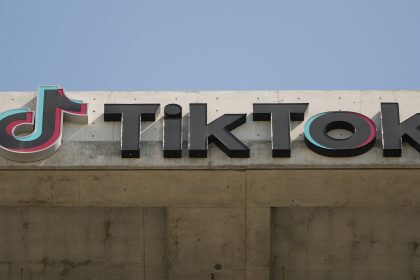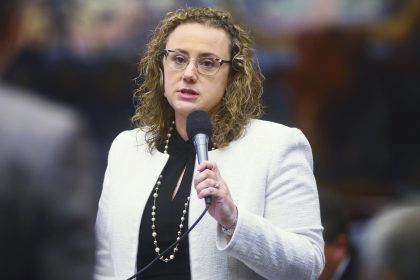Zuckerberg Defends Facebook’s ‘Free Expression’ Policy in Wake of False Trump Campaign Ads

WASHINGTON – Mark Zuckerberg allowed himself only a brief smile Thursday afternoon as he approached the podium awaiting him on stage in Georgetown University’s Gaston Hall.
After weeks of criticism over Facebook’s decision not to moderate political speech or fact-check political ads, the company’s CEO was coming to its defense.
And he was doing so just a few miles from Capitol Hill, where many of the social media platform’s most vocal critics call it little more than a megaphone for hate speech, disinformation and bias.
Several hundred students lined up hours earlier to see Zuckerberg in what was billed as “A Conversation on Free Expression” presented by the Georgetown Institute of Politics and Public Services and its McCourt School of Public Policy.
Also on hand were a small group of student protestors representing the Freedom from Facebook Coalition, who passed out flyers and said they want the Federal Trade Commission to break up Facebook by spinning off WhatsApp, Instagram and Facebook Messenger as independent businesses.
“It’s time to break up big social media,” one of the students said.
Inside Zuckerberg was doing anything but apologizing for Facebook or its decision to leave up false political ads heading into the 2020 presidential election.
Instead, over the course of a 35-minute speech, Zuckerberg argued his company is shaped by his belief “that giving everyone a voice empowers the powerless and pushes society to get better over time.”
He said the early days of Facebook, when it was coming together in a Harvard dorm room, “taught me that while the world’s attention focuses on major events and institutions, the bigger story is that most progress in our lives comes from regular people having more of a voice.”
“Some people believe giving more people a voice is driving division rather than bringing us together,” Zuckerberg said. “[But] voice and inclusion go hand in hand. We’ve seen that throughout history, even if it doesn’t feel that way today.”
To make his case, Zuckerberg invoked the Enlightenment, Frederick Douglass, the Rev. Dr. Martin Luther King Jr., the Vietnam War and a pair of First Amendment cases decided by the U.S. Supreme Court: Schenk v. United States and New York Times v. Sullivan, the latter case defining our modern libel laws.
He also contrasted Facebook’s avowed openness with China, where the authorities control and censor speech, and which he tried unsuccessfully for years to enter to turbocharge his company’s business.
“People having the power to express themselves at scale is a new kind of force in the world — a Fifth Estate alongside the other power structures of society,” Zuckerberg said, pausing a moment later to acknowledge free expression isn’t always pretty.
In times of tension, the “popular impulse is to pull back from free expression. … We can continue to stand for free expression, understanding its messiness … or we can decide the cost is simply too great. I’m here today because I believe we must continue to stand for free expression,” he said.
Firestorm Over Political Speech
With that, Zuckerberg waded into the current controversy over Facebook’s handling of political speech.
Even before his speech was finished, Bill Russo, a spokesman for the presidential campaign of former Vice President Joe Biden, which says it has already been harmed by the new Facebook policy, said Zuckerberg was attempting to use the Constitution “as a shield for his company’s bottom line.”
“His choice to cloak Facebook’s policy in a feigned concern for free expression demonstrates how unprepared his company is for this unique moment in our history and how little it has learned over the past few years,” Russo said.
Another Democratic presidential hopeful, Sen. Elizabeth Warren, D-Mass., accused Facebook of being a “disinformation-for-profit machine” immediately after the new policy on political speech was announced.
And she went a step further, after Facebook refused to remove Trump campaign ads that make false claims, maintaining that it’s not a political gatekeeper, Warren paid for a fake political ad that claimed Zuckerberg and Facebook have endorsed President Donald Trump.
“Breaking news: Mark Zuckerberg and Facebook just endorsed Donald Trump for re-election,” the ad reads. It then goes on to say that while this isn’t true, Zuckerberg has “given Donald Trump free rein to lie” on Facebook.
Facebook responded by tweeting that the Federal Communications Commission “doesn’t want broadcast companies censoring candidates’ speech. We agree it’s better to let voters — not companies — decide.”
Biden has since said said that he’d be open to breaking up Facebook. Sen. Kamala Harris of California, another of the Democratic presidential candidates, has said she would consider new controls on the tech giant.
Facebook’s stand on political speech also illustrates a growing divide between what’s considered permissible by social media companies and more traditional media firms.
Like Facebook, Twitter has said it will not block or otherwise remove accounts of politicians who appear to violate its policies on speech.
Meanwhile, NBC, CNN, MSNBC and CNBC have all taken a harder line, refusing to air political ads that contain false content.
In the case of the Trump ad that Facebook allowed to run, a 30-second spot falsely claiming Biden committed corrupt acts in Ukraine, both CNN and NBC declined to air it on the grounds it violated their standards.
On stage on Thursday, Zuckerberg said Facebook’s policy is intended to “ensure people can see primary source speech from political figures that shapes civic discourse.
“Political advertising is more transparent on Facebook than anywhere else — we keep all political and issue ads in an archive so everyone can scrutinize them, and no TV or print does that,” he said.
“We don’t fact-check political ads. We don’t do this to help politicians, but because we think people should be able to see for themselves what politicians are saying,” Zuckerberg continued. “And if content is newsworthy, we also won’t take it down even if it would otherwise conflict with many of our standards.
“I know many people disagree, but, in general, I don’t think it’s right for a private company to censor politicians or the news in a democracy,” he said.
Where Do You Draw The Line?
Zuckerberg will be back in Washington next week for a hearing on Facebook’s proposed cryptocurrency, Libra.
It will be his second time testifying in front of Congress after April 2018, when he answered lawmakers’ questions on Facebook’s treatment of user data. Like that hearing, next week’s session on the Hill is expected to turn into a wide-ranging review of the company’s business practices.
Perhaps anticipating next week’s line of questioning, Zuckerberg acknowledged that given the sensitivity around political ads, he’s considered whether Facebook should stop allowing them altogether.
“From a business perspective, the controversy certainly isn’t worth the small part of our business they make up,” he said. “But political ads are an important part of voice — especially for local candidates, up-and-coming challengers, and advocacy groups that may not get much media attention otherwise.
“Banning political ads favors incumbents and whoever the media covers,” Zuckerberg asserted. [And] even if we wanted to ban political ads, it’s not clear where we’d draw the line.
“There are many more ads about issues than there are directly about elections,” he said. “Would we ban all ads about healthcare or immigration or women’s empowerment? If we banned candidates’ ads but not these, would that really make sense to give everyone else a voice in political debates except the candidates themselves? There are issues any way you cut this, and when it’s not absolutely clear what to do, I believe we should err on the side of greater expression.”
Outside, after the event, an attendee named Lyla said she thought Zuckerberg “has a real talent for putting a spin on the issues” and is “obviously a very talented speaker.”
Asked why she attended, she called his appearance at the university “a once in a lifetime opportunity to see one of the people who practically rules your life on social media.”
“It was interesting to see him, and I do think he’s right about one thing: this whole concern over political speech on social media only started after political outcomes were not what people wanted them to be.”
Another attendee, Charlie, said, “overall, Zuck’s comments were particularly insightful when it came to freedom of expression.
“He provided a lot of clarity on an issue on which I think there’s been a lot of haziness in the media, and I definitely appreciated that,” he said.
“At the same, because he is at the helm of Facebook and has so much sway over the political culture, hearing him, hearing his thoughts, really helped me personally see what’s going on on the political landscape.”
“I mean, social media is such a large industry and Facebook is such a large corporation within it, I really wanted to see how he is approaching these issues first hand,” Charlie said.























